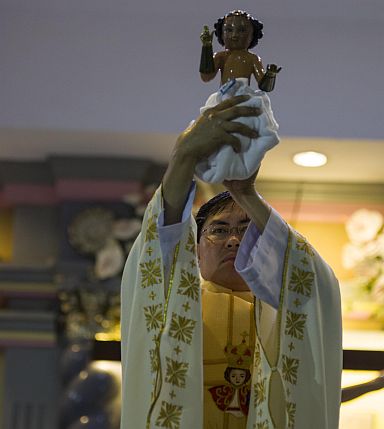
Fr. Pacifico “Jun” Nohara, rector of the Basilica Minore del Santo Niño, presents to the people the image Santo Niño, which is stripped of its vestments during the annual “Hubo” at the Pilgrim Center. (CDN PHOTO/CHRISTIAN MANINGO)
As the 452nd Fiesta Señor comes to an end, devotees of the Santo Niño are called to transform themselves and to make room for God in their lives.
“We need to change our old ways and do what is pleasing to God. The devotion to the Santo Niño must be expressed not only in words but also in what we do,” said Fr.
Pacifico “Jun” Nohara Jr. in his homily in yesterday’s 4 a.m. “Hubo” Mass that capped the religious activities in honor of the Holy Child Jesus.
“No one is perfect — devotee or not. All of us are sinners. That is why God is giving us second, third, and many chances so we will become better persons. May we have the courage to change our hearts and be consistent in doing the right thing,” he added.
At dawn on Friday, Nohara, the rector of the Basilica Minore del Santo Niño, led the annual “Hubo,” a Cebuano word that means “to undress.”
A replica of the original Santo Niño image was stripped of its fiesta clothes, given a ritual bath and fitted with simpler garments.
About 4,000 devotees packed the courtyard of the basilica’s outdoor Pilgrim Center, many of them bringing their own icons of the Santo Niño to be blessed.
“Symbolically, the Hubo calls us to unveil our whole self and reveal in us a renewed spirit. As we end the Fiesta Señor, may we be empowered by the Santo Niño in everything that we do and will do,” Nohara said.
The heart matters
The Augustinian priest said God is neither after what a person possesses, nor his or her credentials, nor one’s religious practices.
The fiesta dress of the Señor Santo Niño is removed, which is part of the “Hubo” ritual, marking the end of the celebration of the Feast of the Santo Niño.
(CDN PHOTO/CHRISTIAN MANINGO)
“God does not look at our resume or our attendance in Sunday Masses or our affiliations in religious organizations. He looks into our hearts, and He chooses those who are willing to obey and do His will,” said the 43-year-old Nohara, a native of Pilar town, Camotes Island in Cebu, who assumed as rector of the Basilica last year.
Concelebrating with Nohara were retired Bishop Christian Vicente Noel, formerly with the Diocese of Talibon in Bohol, and about 50 priests.
The renowned San Diego Dance Troupe also danced the Sinulog during the Mass and Hubo ritual.
A replica of the image of the Santo Niño given by Portuguese explorer Ferdinand Magellan to Cebu’s Queen Juana in 1521 was used in the Hubo ceremony.
The ritual
The ritual began with the removal of the crown, followed by the orb and scepter and armlet, the bands, cape, tunic, inner garments and boots.
As pieces of the clothing were removed, Nohara and the congregation sang “Christe exaudi nos (Christ graciously hear us),” to commemorate the passion and death of Jesus Christ.
After the undressing, the Holy Child’s image was dipped in water, wiped with a towel and dressed in his ordinary garb, starting from his boots up to his crown.
For every piece donned, the faithful sang “Christus vincit, Christus regnat, Christus, Christus imperat (Christ conquers, Christ reigns, Christ commands),” in remembrance of Jesus’ glorious resurrection.
The Hubo ritual ended with a drum roll of the Sinulog beat as the devotees applauded.
The original Sto. Niño image, which was given by Magellan as baptismal gift to Cebu’s Queen Juana in 1521, remains in the marble chapel inside the basilica where pilgrims line up to pay homage.
The changing of the dress of the original image was made in a private ceremony before the feast last Sunday.